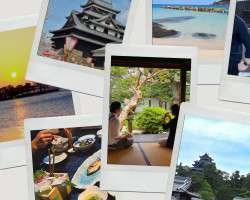
Originally published on metropolis.co.jp on September 2012

You used to have to remove all your headgear when exiting “the foreign area” and entering the portal to quasi-America and quasi-home. Unlike the orthodontic community, Yokosuka Naval Base defines headgear as anything you wear on your head. Why they recently taped over that item on the blue sign with strange rules outside the gate—and why they ever had it for that matter—will remain a mystery to you and probably to the guards who vigorously enforced it even on the most ear-numbing, winter days. You kind of miss it. It furthered the illusion that you were transporting sci-fi style into a new, scary world, and the earmuffs would somehow disrupt the correct ordering of your cerebral atoms once you reached the other side.
It is 16:44 and you are trying to make it back “inside” before the deluge of foot traffic pours from the floodgates. This warp zone is clogged by hordes of Japanese workers exiting at exactly 16:45 every day, who give the guards their heart-felt, “Otsukaresama,” as they reenter the place you have come to ominously refer to as, “out in town,” and they simply call home: Yokosuka, Japan.
You have journeyed out a little past your comfort zone on this day. Instead of getting your usual mayo-tuna onigiri at the 7-Eleven on your way back from the 100-yen store, you venture almost an entire two blocks beyond where any American (you convinced yourself) has ever dared set foot. Anxiety settles in. Maybe you should just go back on base and get a bite at the drive-through Taco Bell. Then you could eat it out on the deck of your spacious, linoleum tower and watch the freighters and fishers navigate the ever-changing waters between the strange lands called Monkey Island and Chiba.
No! Something compels you to branch out; to try something new. You step in front of what you think are automatic doors, but they don’t actually open until you push where it says “push.” A waft of air-conditioning and high-pitched foreign voices welcome you. You have entered a 7-Eleven that you have never entered before, a 7-Eleven you imagine no Status Of Forces Agreement (SOFA)-sponsored visa holder has ever entered before, and suddenly the looming dread that has been following you finally takes shape. You are going to have to use your ridiculously limited Japanese to accomplish the mission that is gradually solidifying in your brain, a brain ridden with the guilt of having lived in Japan for three years without ever having lived in Japan at all.
The mission is clear: you must try a new flavor of onigiri.
You pick up a mysterious rice ball wrapped in seaweed. The radical on one of the kanji seems to evoke an image of beans you remember from a long ago Chinese class. You take it to the counter. You manage to sputter something in a foreign tongue. Something like, “What inside this be?” The response is unintelligible, but you don’t care. You are exhilarated! You just had a full two-sentence conversation in actual Japanese with a real live Japanese person. You press your luck and, feigning delight with the unknown ingredients within your prize, proudly utter:
“Dai suki.”
Then comes an onslaught of linguistic torpedoes out of which you intercept the words “American” and “sailor.” How does this person know you’re American and why does this person assume you’re a sailor just because you’re white and in Yokosuka? Admitting that those are pretty safe assumptions doesn’t take away your sudden flood of desire to morph into Japanese skin. If the base gate has the ability to beam you to Japan, why can’t it make a few adjustments to your ancestry?
Oh, if only you were Japanese! Then you could be whisked away by your onboard voice command GPS to one of the many secluded beaches within a half hour’s drive, mountain bike without getting lost on the web of trails that cover the map from Hayama to Kanazawa Bunko, or even fit into some of the vintage clothing sold at that new shop you heard about by Kenritsu Daigaku station.
It is 16:46. The rather pungent, spider webby stringiness at the center of your prized purchase snaps you out of your reverie as you offer a lame “otsukaresama” to the guard who beeps your ID into the system. You wonder if the fermentation of the supposed beans is intentional.
You are back on the inside. You know this because there is an actual garbage can ahead. You are relieved.
Yet you can’t quite shake the germinating thought that perhaps you don’t need to be Japanese to fully enjoy Yokosuka. Resisting the temptation to dispose of the symbol of your victory into the aforementioned can, you feel a Grinchesque change coming over your heart and taste buds.
Maybe, just maybe, you need to get out more.
Gulp. Mission accomplished.







